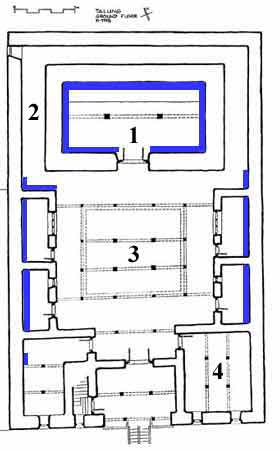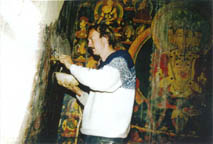 |
|
Talung Monastery, ground
floor, survey & drawing
by Zara Thiessen & John Harrison/THF.
1 main chapel, 2 inner circumambulation path,
3 monks' assembly, 4 tantric chapel.
 |
old murals |
|
|
|

|
Dr.
Uli Eltgen at work stabilizing
the Talung wallpaintings |
Tibet has produced one of the outstanding and unique artistic traditions of the world. But inside Tibet, only few precious examples of great wallpaintings have survived. THF combines its restoration efforts with work on
wallpaintings, by documenting and preserving some of the more outstanding examples that so far have escaped attention.
In 1999, we have launched a pilot mural conservation workshop, with a Western expert analyzing 15th century murals in Lho Talung monastery, and giving basic training to two Tibetan artists. The expert, Dr. Uli
Eltgen, stayed for seven weeks and stabilized the Talung murals which threatened to fall off the walls in large pieces. He also did some work in Merunyingba and Labrang Nyingba in Lhasa. Lho Talung monastery is said to be one of 12 Buddhist temples established by Srongtsan Gampo in the 7th century. Today, one surviving old monastery building of the Sakyapa tradition houses a treasure of
wallpaintings, hitherto unknown to Tibetan art experts. Professor David Jackson has tentatively suggested the murals in the main chapel to be the work of the same group of Newari artists who did the great Gyantse Kumbum murals in the early 15th century. The leaky roof and inadequate drainage were mainly responsible for the poor condition of the Talung murals. Dr. Eltgen has stabilized the most urgent parts, and begun to analyse the materials for a continuation of
stabilising, restoring and cleaning in 2000. THF has built a traditional-style protective roof to prevent further damage to the paintings.
Funded by: Trace Foundation (see chapter 5), Elke Hessel's Shalu Deutschland
e.V. (Dr. Eltgen's expenses) and the Shelley-and-Donald Rubin Foundation (work at
Talung, see chapter 7). |

